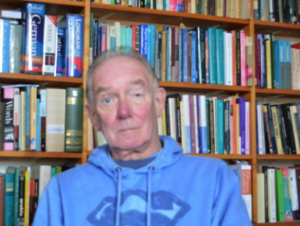27 April 2016
Gordon Tucker (Cardiff University)
Modelling lexical and phraseological phenomena in a Systemic Functional Grammar
The massive expansion of corpus linguistics over recent decades, in terms of size and variety of electronic corpora, the development of search tool software, and the number of researchers engaged in the discipline, has enabled considerable light to be thrown on the nature of lexical organisation and patterning, and especially on the relationship between lexis and grammar. At the same time corpus linguistic and other related research has increasingly emphasised the importance of phraseological phenomena.
Whilst providing substantial evidence for the organisation of lexis, and indeed the lexicogrammar itself, corpus linguistics is not a theory of language in the sense that is understood by ‘generative linguistics’, ‘cognitive linguistics’, ‘systemic functional linguistics’ etc. If such theories wish to incorporate the findings of corpus linguistic research, they need to interpret and explain these findings in terms of their own theoretical precepts.
Arguably, one of the most important achievements of corpus linguistic research has been to reinforce the notion of the inseparability of grammar and lexis (see, for example, Römer 2009). Traditionally, these two aspects of linguistic organisation have been considered separate entities, a position strongly taken in early approaches to Chomskyan generative grammar, with the ‘lexicon’ and ‘syntax’ posited as individual components. Indeed, even more traditionally, linguistic organisation has been divided, in terms of descriptive and reference works, into the ‘grammar (book)’ and the ‘dictionary’.
Within Systemic Functional Grammar (SFG), following Halliday’s suggestion (Halliday 1961), lexis, rather than being seen as a separate ‘entity’ from grammar/syntax, is considered to be ‘most delicate grammar’. From a Sinclairian corpus linguistic perspective, on the other hand, grammar might be considered to be ‘most general lexis’.
In this talk, I will focus on the complementarity of the Hallidayan and Sinclairian positions in sketching out the interrelatedness of and interdependence between lexical and grammatical organisation, this within a model of Systemic Functional Grammar. In keeping with the primary theoretical principles of SFG, the model I discuss and describe will reflect the notion of (semantic) choice, as available to language users, rather than provide a cognitive or psycholinguistic account of lexicogrammatical organisation.
Finally, yet no less importantly, I will show how the model can account for phraseological phenomena, which would seem to lie somewhere between the traditional notions of lexis and grammar.
References
Römer, Ute (2009) The inseparability of lexis and grammar: Corpus linguistic perspectives. Annual Review of Cognitive Linguistics 7 (2009), 141–163.
Halliday, M.A.K (1961) ‘Categories of the theory of grammar’. Word 17:241 92.

Dr Gordon Tucker was formerly Senior Lecturer in the Centre for Language and Communication Research at Cardiff University, and is now, in retirement, Honorary Research Fellow in the same Centre. Gordon’s research is located within the theory of Systemic Functional Linguistics, and in particular in the area of lexical and phraseological organisation within a Systemic Functional Grammar. He is the author of The lexicogrammar of Adjectives (1998, Cassell Academic), and has published more than 40 journal articles and book chapters. He has taught courses as an invited scholar and has been a plenary speaker in Canada, India, South Korea, Brazil, Venezuela, France, Madagascar, Germany, Italy, Belgium and the United Kingdom. Much of his research and subsequent publications have involved modelling lexicogrammatical organisation in the light of corpus linguistic findings, and it has been especially the challenge of corpus linguistic research that has led to his seminal work on phraseology within a Systemic Functional model of language.